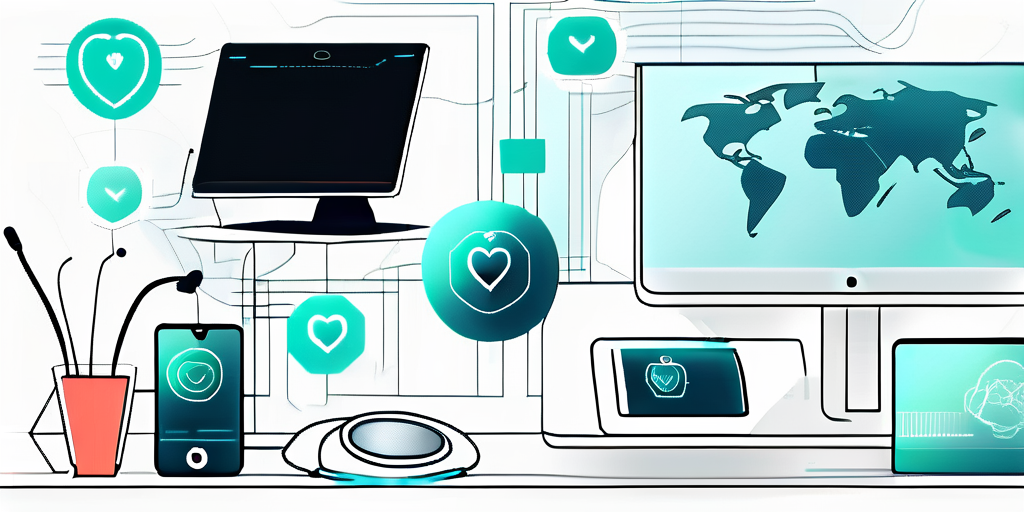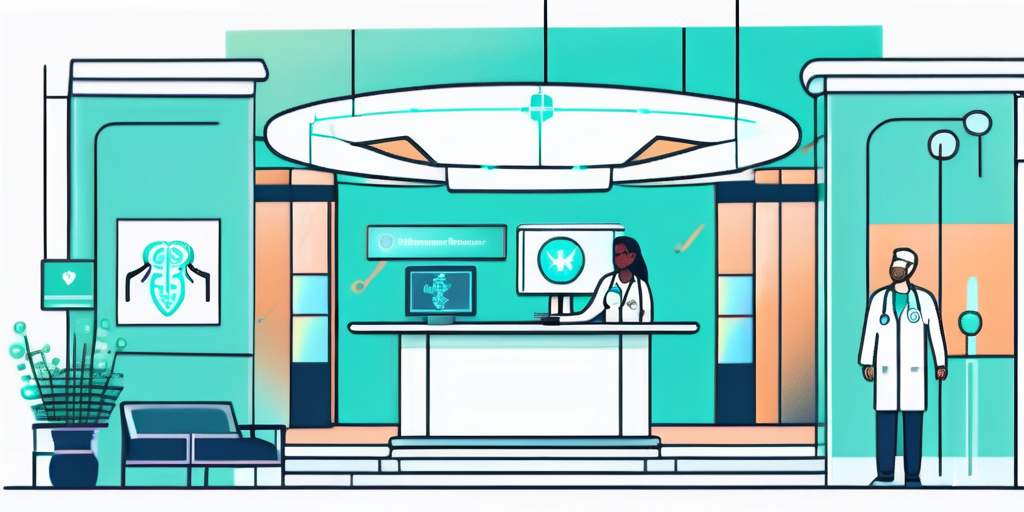In today’s fast-paced world, technology plays a crucial role in almost every aspect of our lives. Healthcare reception is no exception. The integration of technology in the healthcare industry has brought about numerous benefits, but it has also raised concerns about the potential loss of the human touch. Striking a balance between technology and human interaction is paramount to ensuring quality patient care and maintaining patient satisfaction.
Understanding the importance of human touch in healthcare
When it comes to healthcare, the human touch is irreplaceable. Empathy, compassion, and understanding are all essential elements of effective patient care. Research has shown that patients who feel emotionally supported and cared for by their healthcare providers have better treatment outcomes and higher levels of satisfaction. Additionally, human interaction can have a profound psychological impact on patients, alleviating anxiety and providing reassurance during challenging times.
The role of empathy in patient care
Empathy, the ability to understand and share the feelings of another person, is a fundamental aspect of healthcare. Patients often feel vulnerable and scared, especially when dealing with serious medical conditions. Empathetic healthcare professionals can provide the emotional support and comfort needed to navigate these difficult times. Empathy enhances the patient experience and fosters trust between the patient and the healthcare provider.
The psychological impact of human interaction
Studies have shown that human interaction has a positive impact on psychological well-being. Face-to-face interactions trigger the release of oxytocin, often referred to as the “love hormone,” which promotes feelings of trust and bonding. Oxytocin also helps reduce stress levels and improves overall mental health. By incorporating technology without neglecting the importance of human interaction, healthcare providers can ensure a holistic approach to patient care.
Moreover, the human touch in healthcare goes beyond just emotional support. Physical touch, such as a comforting hand on the shoulder or a gentle squeeze of the hand, can convey a sense of warmth and reassurance to patients. This tactile connection can help patients feel valued and cared for, enhancing their overall experience.
Furthermore, the human touch plays a crucial role in effective communication between healthcare providers and patients. Non-verbal cues, such as facial expressions and body language, can convey empathy and understanding in ways that words alone cannot. These subtle gestures can help build rapport and trust, leading to improved patient satisfaction and better treatment adherence.
The rise of technology in healthcare reception
Technology has revolutionised the healthcare industry, allowing for more efficient and streamlined processes. Digitalisation in healthcare reception offers numerous benefits, such as reduced waiting times, improved access to medical records, and enhanced communication between patients and healthcare providers.
In addition to the tangible benefits, the integration of technology in healthcare reception has also led to a significant improvement in data management and analysis. By digitising patient records and administrative tasks, healthcare providers can now harness the power of data analytics to identify trends, improve treatment outcomes, and enhance overall healthcare delivery. This data-driven approach not only benefits individual patients but also contributes to advancements in medical research and public health initiatives.
The benefits of digitalisation in healthcare
Digitalisation has transformed the way healthcare reception functions, benefiting both patients and healthcare providers. Online appointment systems and electronic medical records have streamlined administrative processes and reduced paperwork, allowing healthcare professionals to spend more time focusing on patient care. Digitalisation also enables easier access to information, empowering patients to take an active role in managing their healthcare.
Furthermore, the adoption of telemedicine and remote monitoring technologies has extended the reach of healthcare services to underserved communities and individuals with limited mobility. Patients can now consult with healthcare professionals from the comfort of their homes, reducing the need for physical visits and improving overall healthcare accessibility. This shift towards virtual care has proven particularly valuable during times of crisis, such as the recent global pandemic, where remote healthcare services played a crucial role in maintaining continuity of care.
Potential drawbacks of technology reliance
While technology brings many advantages, it is essential to acknowledge its potential drawbacks. Over-reliance on technology may lead to a lack of personal connection and a loss of empathy in healthcare interactions. Patients may feel dehumanised when their interactions with healthcare providers are predominantly through digital interfaces. Striking a balance between technology and human touch is crucial to ensure that patients receive the care they need while feeling emotionally supported.
Moreover, the rapid pace of technological advancements in healthcare reception raises concerns about data security and privacy. As sensitive medical information becomes increasingly digitised and interconnected, the risk of data breaches and cyber-attacks also escalates. Healthcare organisations must invest in robust cybersecurity measures and compliance protocols to safeguard patient data and maintain trust in the digital healthcare ecosystem.
Striking the balance between technology and human touch
Harmonising technology and human interaction can be challenging but not impossible. Integrating technology into healthcare reception while preserving the human touch allows for a more comprehensive and patient-centric approach.
In the fast-paced world of healthcare, finding the delicate equilibrium between technological advancements and the warmth of human connection is paramount. It is a dance between efficiency and empathy, where each step must be carefully choreographed to ensure patients receive the best possible care.
Integrating technology without losing the personal touch
By using technology to streamline administrative tasks and enhance communication, healthcare reception can create more time for meaningful human interaction. For example, implementing self-check-in kiosks can speed up the registration process, reducing waiting times and allowing staff to focus on providing personalised patient care. It is essential to strike a balance that ensures technology serves as a tool to enhance patient care rather than replacing human interaction entirely.
Moreover, the integration of Artificial Intelligence (AI) and Machine Learning algorithms can assist healthcare professionals in analysing vast amounts of patient data quickly and accurately. This technological support can free up time for clinicians to engage in deeper conversations with patients, building trust and rapport that are essential for effective healthcare outcomes.
Training staff for a tech-human hybrid approach
Ensuring healthcare professionals are properly trained in adopting and utilising technology is crucial for maintaining the human touch. Training programs that emphasise the importance of empathy and interpersonal skills can help healthcare providers effectively integrate technology while still providing compassionate care. Investing in staff development and continuous training will help create a workforce that can navigate the ever-evolving landscape of healthcare reception effectively.
Furthermore, fostering a culture of innovation within healthcare organisations can empower staff to embrace new technologies with confidence. Encouraging a mindset of continuous improvement and learning can lead to creative solutions that blend the best of technology and human care, ultimately benefiting both patients and healthcare providers.
Future trends in healthcare reception
As technology continues to advance, the future of healthcare reception holds exciting possibilities. Innovations in healthcare technology are shaping the way patients interact with healthcare providers and access medical services.
Predicted advancements in healthcare technology
Technological advancements such as telemedicine, wearable devices, and artificial intelligence are set to revolutionise healthcare reception. Telemedicine enables patients to access healthcare remotely, reducing the need for in-person visits and expanding access to medical expertise. Wearable devices can monitor patients’ vital signs and provide real-time data, allowing healthcare providers to deliver personalised care. Artificial intelligence can analyse vast amounts of medical information and assist healthcare professionals in making accurate diagnoses and treatment decisions.
Maintaining human touch in a digital future
Despite these exciting advancements, it is crucial to maintain the human touch in healthcare reception. The power of human interaction, empathy, and compassion cannot be replicated purely through technology. As technology continues to shape the healthcare landscape, it is essential to strike a balance that integrates technological advancements while prioritising meaningful patient interactions.
In addition to the predicted advancements in healthcare technology, there are other trends that are worth exploring. One such trend is the use of virtual reality (VR) in healthcare reception. VR technology has the potential to transport patients to different environments, helping to alleviate anxiety and pain during medical procedures. By immersing patients in a calming and distracting virtual environment, healthcare providers can create a more positive and comfortable experience.
Another trend on the horizon is the integration of blockchain technology in healthcare reception. Blockchain, most commonly known for its association with cryptocurrencies, offers a secure and transparent way to store and share medical records. This technology has the potential to streamline administrative processes, reduce errors, and enhance data security, ultimately improving the efficiency and accuracy of healthcare reception.
Furthermore, the future of healthcare reception may see the rise of personalised medicine. With advancements in genomics and molecular biology, healthcare providers can gain a deeper understanding of an individual’s unique genetic makeup. This knowledge can be used to tailor treatment plans and medications specifically to each patient, improving the overall effectiveness of healthcare delivery.
In conclusion, while technological advancements in healthcare reception hold immense potential, it is crucial to remember the importance of the human touch. By integrating technologies such as telemedicine, wearable devices, artificial intelligence, virtual reality, and blockchain, healthcare providers can enhance patient care and improve efficiency. However, it is vital to strike a balance that preserves the personal connection between patients and healthcare professionals. By embracing these future trends and prioritising meaningful patient interactions, the future of healthcare reception can be both technologically advanced and deeply compassionate.
As we navigate the delicate balance between technological innovation and the irreplaceable human touch in healthcare, your clinic has the opportunity to lead the way. At Clinic Marketing AI, we understand the intricacies of this balance and are dedicated to helping you achieve it. Angelo Rosati, our CEO, brings a wealth of experience in health tech and a commitment to excellence that can elevate your clinic’s patient experience and operational efficiency. Don’t let the digital transformation leave you behind. Book a Call with Us today, and together, we’ll ensure your clinic remains at the forefront of compassionate, cutting-edge healthcare reception.



